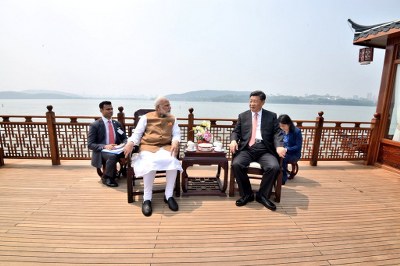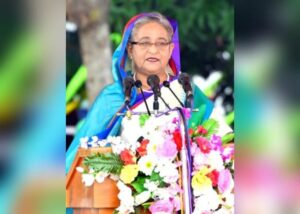Modi, Xi to give guidance to their armies to avert another Doklam

Wuhan (China) : Indian Prime Minister Narendra Modi and Chinese President Xi Jinping will provide “strategic guidance” to their armies to prevent another Doklam-like military stand-off along their long-winding disputed border.
During the two-day informal summit between Modi and Xi in the central Chinese city of Wuhan that ended on Saturday, India and China also decided to work on a joint economic project in Afghanistan, a move that could upset Beijing’s “all-weather ally” and New Delhi’s arch-rival Pakistan, which borders Afghanistan.
In several meetings, terrorism, climate change and other international issues figured on which both leaders had similar views.
“Prime Minister Modi and President Xi reviewed developments in India-China relations from the strategic and long-term perspective,” said India’s Foreign Secretary Vijay Gokhale at a media briefing here.
“They also agreed that both sides have the maturity and wisdom to handle the differences through peaceful discussion within the context of the overall relationship, bearing in mind the importance of respecting each other’s sensitivities, concerns and aspirations.”
Gokhale said Modi and Xi were of the view that Special Representatives on border talks from both countries will have to intensify their efforts to seek a fair, reasonable and mutually acceptable settlement.
He said both leaders underscored the importance of maintaining peace and tranquility in all areas of the India-China border region in the larger interest of the overall development of bilateral relations.
“To this end, they issued strategic guidance to their respective militaries to strengthen communication in order to build trust and mutual understanding and enhance predictability and effectiveness in the management of border affairs,” the Indian Foreign Secretary said.
“The two leaders further directed their militaries to earnestly implement various confidence-building measures agreed upon between the two sides, including the principle of mutual and equal security, and strengthen existing institutional arrangements and information sharing mechanisms to prevent incidents in border regions.”
India and China have a long-standing border issue. The two fought a brief but bloody war in 1962 and have a history of mutual distrust.
In 2017, Indian and Chinese armies were locked in a 73-day stand-off at Doklam in the Sikkim sector along their border. The crisis was resolved in August.
Meanwhile, one of the major decisions at the meet was a joint India-China economic project in Afghanistan. Though sources did not give more details about the project, the move is certain to irk Pakistan which resents India’s presence in the strife-torn South Asian nation.
Pakistan and Afghanistan have a rocky relationship and China has been trying to broker peace between them.
Gokhale said bilateral trade and investment formed an important part of the discussion. “The two leaders underlined trade should be balanced and sustainable and we should take advantage of the complementarities between the two economies to enhance our trade and investment.”
“In that context, the Prime Minister also mentioned the importance of balancing trade and also spoke of the possibility of agricultural export and pharmaceutical exports to China.”
Modi and Xi had six rounds of talks in the two-day summit where they discussed a wide range of issues. The issue of terrorism also came up in the meetings.
“Prime Minister Modi and President Xi recognised the common threat posed by terrorism and reiterated their strong condemnation and resolute opposition to terrorism in all its forms and manifestations. They committed themselves to cooperate on counter-terrorism,” Gokhale said.
Modi left Wuhan for India at 1.30 p.m.
Published :April 28, 2018 at 14:03 IST
IANS





